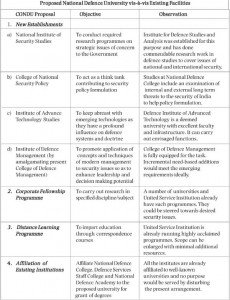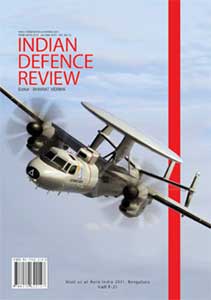Distance Learning Programme
A separate department called National Defence Open University is proposed by CONDU to impart distant education in various disciplines, although at a later stage.
| Editor’s Pick |
Presently, a number of Indian universities are offering distance learning programmes in defence subjects, albeit of indifferent quality. USI also possesses considerable experience in distance learning as it has been conducting highly popular correspondence courses to prepare officers for promotion examinations, Technical Staff College and Defence Services Staff College entrance examinations for the Army and the Navy. Every year, 2,500 to 3,000 officers attend these courses. It would be more prudent to streamline, upgrade and expand existing facilities in the USI and the universities.
Affiliation of Existing Institutions
The proposal suggests affiliation of NDC, National Defence Academy (NDA) and Defence Services Staff College (DSSC) with INDU.
NDA cadets get graduation degrees awarded by Jawaharlal Nehru University. NDC is affiliated to Madras University for the award of M Phil Degree in ‘Defence and Strategic Studies’. Similarly, DSSC is also affiliated to the University of Madras which awards M Sc (Defence and Strategic Studies) degree to all students who qualify on the course. Faculty members can register for M Phil degree. The College has six full time and eight part time vacancies for M Phil. Three vacancies are also available to the College faculty for Ph D. Present arrangements are working very well and one fails to understand the logic in disturbing them, except to justify creation of INDU by expanding its role. See figure above.
The Way Forward
 The current proposal suffers from the following infirmities:-
The current proposal suffers from the following infirmities:-
- It fails to take into account the assets possessed by the country in the form of well established research facilities. Instead of exploiting their full potential, the proposal by implication considers them beyond redemption and ignores them totally.
- It recommends establishment of new facilities, thereby creating unnecessary and totally unwarranted duplication. If accepted, over 135 new vacancies would get created resulting in further increase in Government manpower and related recurring expenditure.
- The proposal seeks a seven year time frame for the completion of INDU’s establishment. It belies need for urgency. A much quicker option would be to tap existing institutions and develop their expertise.
- The proposal has been padded with unnecessary trappings to make it look credible and reasonable. As having a defence university only for research may have looked unconvincing, the scope of the proposal has been enlarged to include training, distance education and affiliation of existing institution. Actually, these add-ons dilute the primary objective of the proposal mooted by GoM and weaken focus on security related research.
As seen earlier, deficiencies of the present system are not due to lack of facilities or due to indifferent quality of research. It is just that their potential is not utilised by the decision makers. Take the case of NDC. Despite the lofty objectives for which it was founded, the bureaucracy considers it to be of little value and never sends its upcoming and bright officers for training. As per the list of prominent alumni (as shown on the College’s website), only two bureaucrats who attended National Security and Strategic Studies Course rose to the level of Secretary to the Government of India in the last 46 years.
Establishment of INDU at a huge cost to the exchequer will serve little purpose except create additional vacancies and bloat manpower.
On the other hand, it is a merit-based and highly sought after course for the services – numerous Chiefs and other top brass appear in the list of prominent alumni. It just goes to show that the civil services do not consider it worthwhile to spare their best talent for acquiring strategic orientation.
The most pressing need, therefore, is to change mindset of Government functionaries. Research remains academic and is carried out in ‘policy vacuum’ as officials rarely seek inputs. Security policy planners should be encouraged to seek independent viewpoints. They must understand that acceptance of external advice does not show their inadequacy in any way. On the contrary, it displays an attitude of integrated, collaborative and holistic approach towards long term security assessments and policy formulation. Comprehension of strategic imperatives can only be done in a collegiate manner with inputs provided by various specialists. Unfortunately, critical comments by analysts are not taken kindly by the functionaries. Such a regime not only discourages honest advice but, more harmfully, lowers the quality of research. Competent academicians recoil from such a system.
Synergy between research scholars and Government functionaries can only be achieved by regular interaction and mutual confidence. There is a need to inculcate and nurture strategic thought in body politic. Research institutions can become centres of excellence and vibrant ‘think tanks’ only if their reports are valued and given due consideration.
 India possesses research facilities of world standing. Their existing competencies must be harnessed and exploited. Minor restructuring of establishments, liberal funding, focused issue-specific research and greater autonomy will contribute immensely in creating dynamic and responsive environment for the study of strategic security matters. Establishment of INDU at a huge cost to the exchequer will serve little purpose except create additional vacancies and bloat manpower. The solution lies in replacing indifference and apathy of the policy makers by a healthy respect for strategic studies and research carried out by scholars at existing institutions.
India possesses research facilities of world standing. Their existing competencies must be harnessed and exploited. Minor restructuring of establishments, liberal funding, focused issue-specific research and greater autonomy will contribute immensely in creating dynamic and responsive environment for the study of strategic security matters. Establishment of INDU at a huge cost to the exchequer will serve little purpose except create additional vacancies and bloat manpower. The solution lies in replacing indifference and apathy of the policy makers by a healthy respect for strategic studies and research carried out by scholars at existing institutions.




